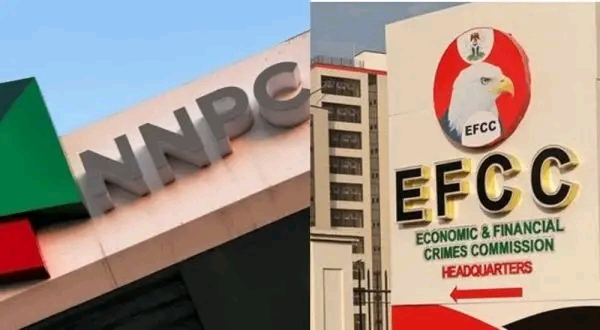By Aminu Umar
The recent move by Nigeria’s anti-corruption agency, the Economic and Financial Crimes Commission (EFCC), to probe the handling of finances and contracts related to the Port Harcourt and Warri refineries has stirred a heated debate on whether the investigation represents a genuine drive for transparency or a politically motivated witch-hunt.
At the heart of the issue is the EFCC’s request for salary records and allowances of 14 key officials who served during the refinery rehabilitation period. These include high-ranking executives such as Abubakar Yar’Adua, Mele Kyari, Isiaka Abdulrazak, Umar Ajiya, Dikko Ahmed, Ibrahim Onoja, Ademoye Jelili, and Mustapha Sugungun.
Others listed are Kayode Adetokunbo, Efiok Akpan, Babatunde Bakare, Jimoh Olasunkanmi, Bello Kankaya, and Desmond Inyama. The commission appears focused on payments and administrative decisions linked to the multi-billion naira refinery resuscitation program.
However, conspicuously absent from the list of those summoned is Adedapo Segun, the current Chief Financial Officer (CFO) of the Nigerian National Petroleum Company Limited (NNPCL), who served as Executive Vice President for Downstream and was directly in charge of treasury, refinery operations, shipping, and trading. During this time, all payments related to the Port Harcourt and Warri refineries were made under his financial supervision.
This omission has raised several questions: Why is Segun not being invited or questioned if the goal is transparency? Why is the probe appearing selective?
Equally puzzling is the inclusion of Abubakar Yar’Adua, whose role is administrative rather than operational, while high-profile former Group Managing Directors (GMDs) such as Andrew Yakubu and Emmanuel Ibe Kachikwu, who played central roles in refinery policy and contracts in previous administrations, appear to have been bypassed.
We are not saying Mele Kyari is innocent or guilty, but we must insist on a fair process,” a stakeholder familiar with the situation told this reporter. “This shouldn’t be a selective trial. The people who gave out the contracts and approved the funds must be investigated too.”
The tension is heightened by growing concerns that the probe is targeted at individuals from a specific region. Many observers fear this could deepen regional mistrust, especially if only northern executives are made scapegoats.
We are worried this is being used to paint Northerners as the only looters,” said one source. “You cannot fight corruption with bias. You need to look at all sides. This includes those who were ‘exonerated’ too quickly.”
Another burning question is why individuals such as Emmanuel Ibe Kachikwu, former Minister of State for Petroleum, and Andrew Yakubu, former GMD of NNPC, who had strategic influence on contract awards and rehabilitation policies, are not facing any scrutiny. Critics argue that anyone involved at any stage of the refinery rehabilitation—whether from policy, finance, or operational perspectives—should be equally held accountable.
Civil society groups and international anti-corruption bodies are now being urged to step in. The call is for an independent and thorough probe that includes all relevant stakeholders—without exception.
“We are calling on NGOs and international organisations to ensure that this is not a political trial. If you must clean up the refinery system, you must do it across the board,” the statement concluded.
In a country plagued by decades of failed refinery operations and opaque oil sector dealings, the public is watching this investigation closely. The EFCC is at a crossroads: its actions will either affirm its commitment to justice or expose it to accusations of being used as a tool for political vendettas.
For now, Nigerians wait—with growing skepticism.


